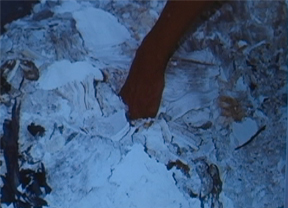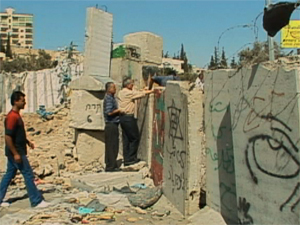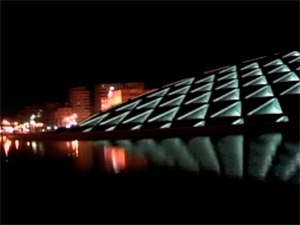 |
Hand in the ashes of book, Iraq, Save and Burn, Julian Samuel, 2004 |
Save and Burn is a compelling commentary on the world of libraries as well as a compressed history of their importance from the days of the ancient Sumerians -credited with inventing writing to save administrative records- to current day Iraq , where people, along with libraries, are the victims of massive burning and destruction. It is also a dispassionate analysis of the role of libraries as repositories of historical notions of the self and a passionate cri de coeur against the systematic annihilation of such notions, such as the gradual strangulation of Palestinian identity. If the juxtaposition of placid images of libraries where silence reigns with images of armed conflict in Israel/Palestine and Iraq strikes the viewer as jarring at first, upon reflection, one realizes that it is not the images that jar, but reality itself. Why burn books –alongside countless human beings – if not to reduce the truth to ashes? Moreover, such contrasting imagery speaks to the need for librarians to take to the streets to defend their privilege to continue to house the patrimony of humanity.
The film opens up with the following quote from Carl Sagan (Cosmos): “Only once before in our history was there the promise of a brilliant scientific civilization. Beneficiary of the Ionian Awakening it had its citadel at the Library of Alexandria, where 2,000 years ago the best minds of antiquity established the foundations for the systematic study of mathematics, physics, biology, astronomy, literature, geography and medicine. We build on that foundation still.” |
 |
Apartheid wall in the Jewish State, image: Mary Ellen Davis, (Save and Burn, Julian Samuel 2004) |
Who would want to destroy such a foundation? The culprits, say multiple voices, are the forces that would replace civilization with barbarism. Take the wanton destruction inflicted on Palestinian libraries and cultural centres by the Israeli government. Or the fire set to the United Talmud Torah Library in Montreal in 2004. Or the appropriation, by the Israeli government, of books ordered by Palestinians, and their subsequent delivery to the Hebrew University library, proving that the powers that be fear, not knowledge per se, but knowledge in the “wrong” hands, that is, in the hands of “others”.
Such destruction is not achieved by means of brimstone and fire alone. The closure of libraries due to “lack of funding” is an obvious device. Legislation is another powerful weapon for the mass destruction of knowledge. For example, the USA Patriot Act of 2001, allows the government to peer over the shoulders of its citizens as they read while increasingly denying them the information they seek. The gradual disappearance of library catalogues is a stratagem to control what people read. The digitalization of knowledge, while contributing to its speedy dissemination over the ether, is also contributing to its ethereal and ephemeral nature. The privatization of human knowledge, of course, is the most insidious version of this onslaught.
 |
Bibliotheca ALexandrina at night, Save and Burn, Julian Samuel, 2004 |
Libraries, says Irish author Declan Kiberd, are utopian spaces for the disenfranchised Irish, and hence promote democracy, but they can also be used for state control. Libraries, says Julian Samuel's off-camera voice, produce knowledge about democracy at home and export terror abroad. Libraries are also beautiful, says the director's camera. Samuel, a painter, filmmaker and writer, lets our eyes lovingly linger over the long hall of Trinity College Library. He also treats us to a panoramic view of The Bibliotheca Alexandrina, arisen from the ashes of its illustrious predecessor. Its director, Ambassador Taher Khalifa, tells us that this library, partially funded by several Arab countries, is shaped like an incomplete sun disk symbolizing the incomplete nature of knowledge – and presumably its illuminating attributes.
Save and Burn is a follow-up on The Library in Crisis, in which the author traces the history of libraries and libricides while allowing us a glimpse into the multicultural world of libraries in 5 th century India . It is also a fervent plea for us, as free and independent thinkers, to unite in defence of our right of access to the knowledge that we have accumulated as a species. Most importantly, it is an aesthetically pleasing and lyrical reminder of the links between the contemplative space of reading rooms and the hustle and bustle of life out there.
[For more information on “Burn and Save” please contact: juliansamuel@videotron.ca. More information can also be obtained at www.juliansamuel.net]